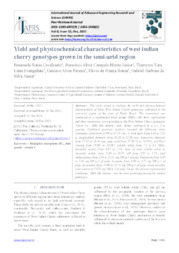Yield and physicochemical characteristics of west indian cherry genotypes grown in the semi-arid region.
Yield and physicochemical characteristics of west indian cherry genotypes grown in the semi-arid region.
Author(s): CAVALCANTE, E. S.; MONTE JÚNIOR, F. A. C.; EVANGELISTA, T. Y. L.; PEREIRA, G. A.; SOUZA, F. de F.; SILVA JÚNIOR, G. B. da
Summary: This study aimed to evaluate the yield and physicochemical characteristics of three West Indian Cherry genotypes cultivated in the semi-arid region of the state of Piauí, Brazil. The experiment was conducted in a randomized block design (RBD) with three replications and three treatments, corresponding to the West Indian Cherry genotypes ‘Clone 14’, ‘BRS 366 Jaburu’, and ‘Junko’ cultivated in a 4 x 3 m spacing. Combined genotype analysis revealed the following mean variations: yield from 22.96 to 47.53 t ha -1; fruit mass from 4.18 to 5.52 g; longitudinal diameter from 20.28 to 22.80 mm; transverse diameter from 17.32 to 18.42 mm, pulp yield from 27.58 % to 34.54%; red Hue° varying from 19.00° to 26.00°; soluble solids from 7.2 to 8.1 °Brix; titratable acidity from 0.82 to 1.34; ratio of total soluble solids to titratable acidity from 5.00 to 10.37; pH from 3.52 to 3.74; total anthocyanins from 2.56 to 12.11 mg.100 g-1 of pulp; flavonoids from 4.30 to 7.44 mg.100 g-1 of pulp; lycopene from 0.30 to 4.71 mg.100 g-1 of pulp; β-carotene from 14.00 to 32.51 mg 100 g-1 of pulp; mean ascorbic acid content of 2.676 mg.100 g-1 of pulp. Under the present experimental conditions, “BRS 366 Jaburu” was the most promising among the studied genotypes.
Publication year: 2021
Types of publication: Journal article
Unit: Embrapa Semi-arid Region
Observation
Some of Embrapa's publications are published as ePub files. To read them, use or download one of the following free software options to your computer or mobile device. Android: Google Play Books; IOS: iBooks; Windows and Linux: Calibre.
Access other publications
Access the Agricultural Research Database (BDPA) to consult Embrapa's full library collection and records.
Visit Embrapa Bookstore to purchase books and other publications sold by Embrapa.

